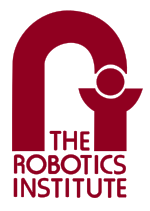This article has multiple issues. Please help improve it or discuss these issues on the talk page. (Learn how and when to remove these messages)
|
 | |
| Type | Private |
|---|---|
| Established | 1979; 46 years ago (1979) |
| Director | Matthew Johnson-Roberson |
| Location | Pittsburgh, Pennsylvania |
| Campus | Urban |
| Website | http://www.ri.cmu.edu/ |
The Robotics Institute (RI) is a division of the School of Computer Science at Carnegie Mellon University in Pittsburgh, Pennsylvania, United States. A June 2014 article in Robotics Business Review magazine calls it "the world's best robotics research facility" and a "pacesetter in robotics research and education."
The Robotics Institute focuses on bringing robotics into everyday activities. Its faculty members and graduate students examine a variety of fields, including space robotics, medical robotics, industrial systems, computer vision and artificial intelligence, and they develop a broad array of robotics systems and capabilities.
Established in 1979 by Raj Reddy, the RI was the first robotics department at any U.S. university. In 1988, CMU became the first university in the world offering a Ph.D. in Robotics.
In 2012, the faculty, staff, students and postdocs numbered over 500, and the RI annual budget exceeded $65M, making the RI one of the largest robotics research organizations in the world.
The RI occupies facilities on the Carnegie Mellon main campus as well as in the Lawrenceville and Hazelwood neighborhoods of Pittsburgh, totaling almost 200,000 sq. ft of indoor space and 40 acres of outdoor test facilities.
Major centers
The National Robotics Engineering Center (NREC) was established in 1996 as the commercial arm of the RI, with the intention of applying robotic technology to commercial and defense applications. It has partnered with more than 300 companies such as General Motors, GE Ventures, Google and Apple, as well as with the U.S. military.
In September 2015, the NREC secured a $5.5 million gift from the car transport company, Uber, to support three robotics fellowships and research directed at developing safe, self-driving cars. This donation was made roughly seven months after Uber poached 40 NREC scientists, including its director, Tony Stenz, and other key program leaders, while the two organizations closely collaborated on driverless technologies.
The Field Robotics Center (FRC) has developed a number of significant robots, including Sandstorm and H1ghlander, which finished second and third in the 2005 DARPA Grand Challenge, and Boss, which won the 2007 DARPA Grand Challenge.
Media coverage and awards
In his book Almost Human: Making Robots Think, Lee Gutkind describes the development of robots at the Robotics Institute, particularly focusing on the developers and describing field testing in remote locations.
The robot HERB was featured in the "Oreo Separator" video series.
RI robots and researchers have been featured in the Scientific American Frontiers episode "Natural Born Robots" and in multiple NPR radio segments.
The Advanced Robotic Laser Coating Removal System (ARLCRS) won a 2013 Edison Award gold award in the category of materials science processes.
Notable faculty (current and past)
- Chris Atkeson
- Howie Choset
- Matthew Johnson-Roberson
- Takeo Kanade
- Pradeep Khosla
- Matt Mason
- Hans Moravec
- Raj Reddy
- Katia Sycara
- Sebastian Thrun
- David Touretzky
- Manuela Veloso
- Red Whittaker
- Jessica Hodgins
Patents
References
- ^ Edwards, John (6 June 2014). "Carnegie Mellon: The World's Premier Robotics Institute?". roboticsbusinessreview.com. Robotics Business Review. Retrieved 10 September 2015.
- "Robotics Institute: History of the Robotics Institute". Archived from the original on 2015-06-27. Retrieved 2011-08-02.
- ^ Robotics Institute: About the Robotics Institute Archived May 9, 2008, at the Wayback Machine
- "The 10 Best Universities For Robotics In The US". Business Insider. Retrieved 2017-05-18.
- "Uber gives $5.5M to Carnegie Mellon for robotics fellowships". The Washington Times. Retrieved 9 September 2015.
- Ramsey, Mike; Macmillan, Douglas (31 May 2015). "Carnegie Mellon Reels After Uber Lures Away Researchers". The Wall Street Journal. Retrieved 10 September 2015.
- *Gutkind, Lee (2006). Almost Human: Making Robots Think. New York: W.W. Norton. ISBN 978-0-393-05867-3.
- Knife-wielding robot HERB separates Oreo cookies
- "NATURAL BORN ROBOTS"- SHOW 1002, on season 10, episode 2". Scientific American Frontiers. Chedd-Angier Production Company. 1999–2000. PBS. Archived from the original on 2006-01-01.
- Robot Receptionist Dishes Directions and Attitude
- Robo-cup
- A Hall of Fame for Robots
- Robot Road Test
- I, Robot
- 2013 Edison Award Winners
External links
- Robotics News
- Robotics Institute Official Website
- Travel Channel showcase of the RI
- NREC Website
- FRC Website
